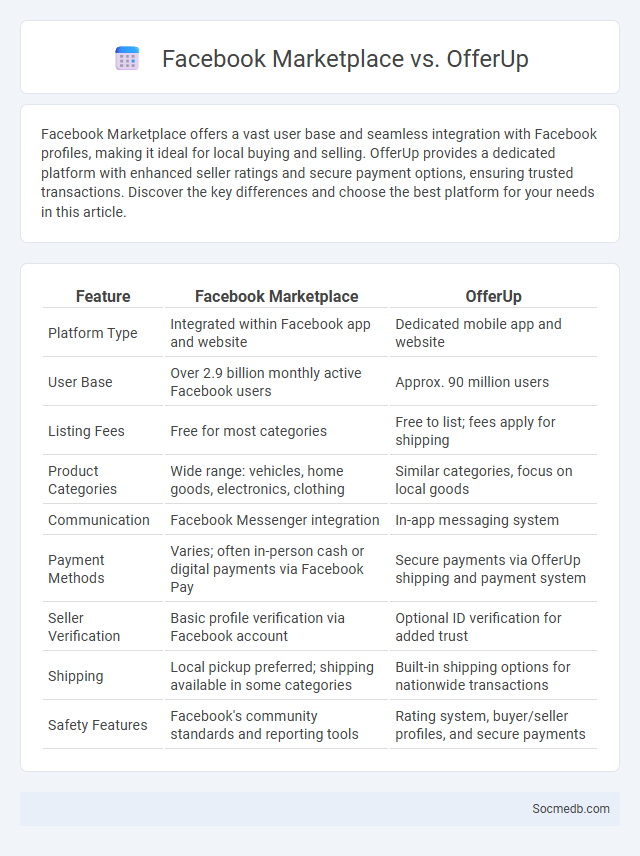
Photo illustration: Facebook Marketplace vs OfferUp
Facebook Marketplace offers a vast user base and seamless integration with Facebook profiles, making it ideal for local buying and selling. OfferUp provides a dedicated platform with enhanced seller ratings and secure payment options, ensuring trusted transactions. Discover the key differences and choose the best platform for your needs in this article.
Table of Comparison
| Feature | Facebook Marketplace | OfferUp |
|---|---|---|
| Platform Type | Integrated within Facebook app and website | Dedicated mobile app and website |
| User Base | Over 2.9 billion monthly active Facebook users | Approx. 90 million users |
| Listing Fees | Free for most categories | Free to list; fees apply for shipping |
| Product Categories | Wide range: vehicles, home goods, electronics, clothing | Similar categories, focus on local goods |
| Communication | Facebook Messenger integration | In-app messaging system |
| Payment Methods | Varies; often in-person cash or digital payments via Facebook Pay | Secure payments via OfferUp shipping and payment system |
| Seller Verification | Basic profile verification via Facebook account | Optional ID verification for added trust |
| Shipping | Local pickup preferred; shipping available in some categories | Built-in shipping options for nationwide transactions |
| Safety Features | Facebook's community standards and reporting tools | Rating system, buyer/seller profiles, and secure payments |
Understanding Facebook Marketplace: Key Features
Facebook Marketplace enables users to buy and sell items locally with ease, offering features like product listings, price filters, and location-based searches. It supports direct messaging between buyers and sellers, enhancing communication and negotiation. Advanced tools include category-specific browsing and saved searches, streamlining the user experience on the platform.
OfferUp Overview: What Sets It Apart?
OfferUp stands out in the social media marketplace landscape by emphasizing local buying and selling with an easy-to-use mobile app that facilitates secure transactions through integrated chat and user ratings. Unlike traditional platforms, OfferUp's focus on community trust and safety features such as user profiles, background checks, and in-app payment options enhances the overall experience. The platform's algorithm promotes relevant listings based on location and user preferences, driving engagement and faster sales compared to competitors.
Marketplace: Defining the Third Platform
The social media Marketplace serves as the third platform by integrating e-commerce directly within user interactions, enabling seamless buying and selling experiences. Leveraging data-driven algorithms, these platforms optimize product recommendations and targeted advertising to enhance user engagement and conversion rates. Major players like Facebook Marketplace, Instagram Shopping, and TikTok Shop exemplify this shift, transforming social media into robust commercial ecosystems.
User Experience Comparison: Navigation and Ease of Use
Social media platforms vary significantly in navigation and ease of use, with user-friendly interfaces enhancing engagement and retention. Intuitive design elements like streamlined menus, clear icons, and responsive touch controls directly impact Your satisfaction and efficiency in interactions. Platforms such as Instagram prioritize visual content with simple swiping gestures, while Facebook offers more complex navigation due to its diverse features, affecting overall user experience.
Listing Process and Seller Tools
The listing process on social media platforms streamlines product visibility by allowing sellers to easily upload and showcase their items through integrated seller tools. These tools provide analytics, inventory management, and customer interaction features that help you optimize your sales strategy and improve engagement. Efficient use of seller tools enhances product listings, driving higher conversion rates and expanding your digital marketplace presence.
Local Buying and Selling: Reach and Safety
Local buying and selling on social media platforms maximize your reach by connecting you directly with nearby buyers and sellers, enhancing convenience and speed. Safety is prioritized through verified profiles, secure payment options, and integrated messaging systems that protect your personal information. Utilizing localized groups and marketplace features ensures trust and reduces risks associated with long-distance transactions.
Fees, Costs, and Payment Methods
Social media platforms often generate revenue through fees for advertising, premium subscriptions, and in-app purchases, which vary widely depending on the service and region. Payment methods typically include credit cards, digital wallets like PayPal, and mobile payment options, ensuring You can choose the most convenient and secure way to complete transactions. Understanding these fees and payment methods helps maximize your budgeting and overall experience on social media networks.
Trust & Security: Reviews, Ratings, and Dispute Resolution
Social media platforms implement robust trust and security measures through verified user reviews and transparent rating systems that help authenticate experiences and build community confidence. Advanced dispute resolution frameworks address conflicts efficiently by offering timely mediation tools and clear reporting procedures, reducing fraud and misinformation risks. Emphasizing data encryption and privacy safeguards, these platforms protect user information while ensuring accountability and integrity in digital interactions.
App Availability and Platform Integration
Social media platforms are widely available across multiple operating systems, including iOS, Android, and web browsers, ensuring seamless access for users on smartphones, tablets, and desktops. Integration with various third-party applications and services such as messaging apps, e-commerce platforms, and content management systems enhances user engagement and data synchronization. Cross-platform compatibility supports features like single sign-on (SSO) and real-time notifications, optimizing the user experience across diverse digital ecosystems.
Which Marketplace is Best for You?
Choosing the best social media marketplace depends on your target audience, product type, and business goals. Facebook Marketplace offers broad reach with diverse demographics suitable for local and nationwide sales, while Instagram Shopping excels for visually-driven brands targeting younger users through curated feeds and influencer partnerships. For professional services and B2B products, LinkedIn Marketplace provides a network-focused environment ideal for generating high-quality leads and building industry connections.
 socmedb.com
socmedb.com